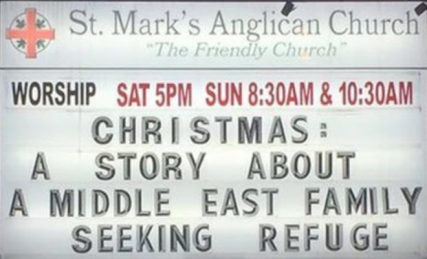By Deb Conklin

There is a popular picture circulating on Facebook of a church reader board that says: Christmas: A story about a middle east family seeking refuge. I was taken by this meme, and shared it on my Facebook page. But there are apparently many Christian bloggers who are offended by this message. I refuse to give them support by including links. But trust me, they exist. Their claim “Christmas is about Jesus, not refugees.” seems to be that one can (and should) somehow separate the story of Jesus birth from any mention of refugees. But that flies in the face of the texts.
Luke’s Gospel tells us that Mary and Joseph were forced by an order of the Roman Emperor to journey from Nazareth to Bethlehem even though Mary could have her baby any day. So, because of an order from the occupying Romans, this very pregnant woman and her new husband walked (Mary may have ridden a donkey, but the text does not tell us that) this eight to 10 day journey.
While there is some dispute about the exact significance of the phrase usually interpreted as “There was no room for them at the inn” we can be sure that, when they arrived, Bethlehem was crowded with other families forced to make a similar journey. And by all biblical accounts, Mary and Joseph were simple people of limited economic resources. So they did NOT travel in style. Their experience was very much like today’s refugees: people forced by world politics and oppressive governments to leave their homes and travel to places teaming with other displaced people looking for food and shelter, while lacking the resources to obtain these scarce necessities.
It is true that Luke’s Gospel is the only one with this story of the journey from Nazareth to Bethlehem. But Matthew’s Gospel has an even clearer story of Jesus as refugee. After his birth, when the astrologers come to Jerusalem asking about the child that is born, Herod goes looking for a baby in Bethlehem. Joseph flees with his family to Egypt where they live as refugees — fleeing the murderous intentions of Herod. After Herod’s death, Joseph tries to return home with his family. But when they learned that Herod’s son was ruling, they headed to Galilee instead, and Jesus was raised in exile, in Nazareth. As neither Mark nor John include an information about Jesus’ birth or childhood, the only two narratives of Jesus early years depict him as a refugee.
Why does this matter? It matters because so many people who call themselves Christians, Disciples, followers of Jesus, do not know or understand our own story. This is a story that reinforces Jesus repeated messages of radical hospitality. Feed the hungry; welcome the stranger; share your resources – even if you have only one cloak, offer it to the needy stranger. And Jesus challenges the accepted wisdom that ‘love your neighbor’ only applies to others like me. When he is asked, “Who is my neighbor?” he picks the people most despised by the Jews of his day – the Samaritans – as his example.
Instead of arguing that Jesus was not a refugee, we should be asking, how does his story inform our present situation? What can we learn about how to respond to those who are ‘other’ (different from me – not a member of my tribe or family) and those who are refugees?
We learn by Jesus example. Jesus welcomes everyone, Jew, Samaritan, beggar, and Pharisee. And Jesus invites us to learn to build community with those who are ‘other’. How do we do that? In Spokane, we do that by extending our comfort zone to include those who are ‘other.’ Maybe it means we find a way to adopt a chronically homeless person. Maybe it means that we help on convicted felon who has served their sentence to return to our community and restart a life here. Surely it means, at the very least, that we speak out when people demonize those who are different by using the term ‘illegal aliens’ and criminals in reference to refugees; or by spreading fear and using the misleading term ‘sanctuary city’.
My friend Joan Medina has started a non-profit called Brigid’s Cloak. She offers people the opportunity to form relationships with, and offer assistance to, the chronically homeless people in Spokane. The Spokane Police department offers ordinary civilians the opportunity to ride along with an officer for a shift and get a sense of what happens on our streets.
If those seem a little to risky, become a regular volunteer at a program like Shalom Ministries and let yourself enter into a relationship with a homeless person. Listen to their stories. Enter into their world and learn what it is to be vulnerable, hungry and homeless.
Christmas is a time for celebrating Emmanuel (which means God-with-us) the God who’s love is so deep that God takes on our human form and lives among us to model for us the life that God envisions for all of us. The God who risks everything for love. If God can love us deeply flawed and self-centered humans this much, surely we can learn to love one another.
“This year, this year, let the day arrive, when Christmas comes for everyone… “ Star Child, by Shirley Erena Murray







Thank you for bringing the message of the Gospel home! For infusing us to step outside our comfort zone trusting Jesus with the results. Good read.